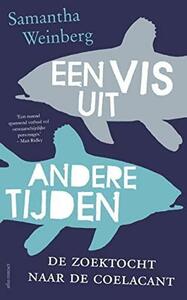Take a photo of a barcode or cover
A solid piece of science writing about a discovery we are still only starting to understand. Great example of scicomm and telling the story through people as they will always be the most fascinating characters to us other humans reading the story!
adventurous
informative
mysterious
medium-paced
informative
slow-paced
Well.. I learned a lot about a fish I d didn’t care about before and can’t say I care too much about now, even after almost 200 pages. The author did make this slightly more interesting than reading a timeline of facts, but I struggled to become invested.
The fascinating story about the discovery of a dead coelacanth in South Africa and the ensuing battle among scientists, adventurers and countries to find a living specimen and research this possible “missing link” is brought to vivid life by Weinberg. Her portrayal of the personalities involved is masterful. - Lynn H. -
adventurous
informative
reflective
medium-paced
I'm not a big nonfiction reader, primarily because no matter how interesting the topic, the writing can be so stale. This was not one of those books. The author did a wonderful job weaving the biographies of several coelacanth-adjacent scientists, history, interviews, and biology into a compelling read. I was excited every night to get into bed and see what would happen next.
One thing I thought was amiss - and maybe I'm getting into some larger, institutional, structural stuff here, but it's worth discussing - is how much the book skirted around issues of colonialism. Much of the coelacanth's discovery is based in 1930's-1960's South Africa and the Comoros islands, a French settlement, but the neither the author nor any of the subjects thought to spend any time discussing any sort of political, racial, or class issues that surely must have arisen. I mean, the whole concept of these people just snuggling into Africa and then collecting (read: killing) random wildlife to store in museums is...fucking gross. One scientist is even known to just dynamite reefs and then collect all the dead fish that float to the surface and this is described as ~eccentric~ and not absolutely horrible and devastating to a reef. There are a couple chapters even devoted to the French ~collecting~ dozens and dozens of coelacanths for decades before going "Oh fuck are there even that many of these?" and this is glossed over as Fine and Normal and Just Science.
I have been thinking about indigenous knowledge of marine life - what do people know? What have people known? Because surely it is a lot. Our oceans are individually, locally known to the people who have lived and survived next to them for hundreds and sometimes thousands of years, but our capital K knowledge of the ocean is privileged to western Marine Biology, which has only been around for like 300 years and is legit kind of basic and primarily involves just slaughtering a bunch of shit and sticking it in formaldehyde and then keeping it in a box. How dumb.
This book does demonstrates through some shorter anecdotes of local fishermen in the Comoros and Indonesia that yeah, people have known about the coelacanth for a long time. But because they didn't suspect the fish was ~The Missing Link~ (ya'll it's not, that's so stupid a fish didn't LITERALLY walk out of water okay) they're like these quaint idiots who just know the fish will give you diarrhea if you eat it. It just felt kind of gross - like this kind of knowledge and experience didn't matter as much as that of the Scientists' when in fact the scientists very greatly benefited from the knowledge, experience and skill of local, indigenous fishermen. Food for thought. I'd be very interested to read any kind of marine biology that privileged that kind of knowledge over western science and will keep an eye out for something like that.
One thing I thought was amiss - and maybe I'm getting into some larger, institutional, structural stuff here, but it's worth discussing - is how much the book skirted around issues of colonialism. Much of the coelacanth's discovery is based in 1930's-1960's South Africa and the Comoros islands, a French settlement, but the neither the author nor any of the subjects thought to spend any time discussing any sort of political, racial, or class issues that surely must have arisen. I mean, the whole concept of these people just snuggling into Africa and then collecting (read: killing) random wildlife to store in museums is...fucking gross. One scientist is even known to just dynamite reefs and then collect all the dead fish that float to the surface and this is described as ~eccentric~ and not absolutely horrible and devastating to a reef. There are a couple chapters even devoted to the French ~collecting~ dozens and dozens of coelacanths for decades before going "Oh fuck are there even that many of these?" and this is glossed over as Fine and Normal and Just Science.
I have been thinking about indigenous knowledge of marine life - what do people know? What have people known? Because surely it is a lot. Our oceans are individually, locally known to the people who have lived and survived next to them for hundreds and sometimes thousands of years, but our capital K knowledge of the ocean is privileged to western Marine Biology, which has only been around for like 300 years and is legit kind of basic and primarily involves just slaughtering a bunch of shit and sticking it in formaldehyde and then keeping it in a box. How dumb.
This book does demonstrates through some shorter anecdotes of local fishermen in the Comoros and Indonesia that yeah, people have known about the coelacanth for a long time. But because they didn't suspect the fish was ~The Missing Link~ (ya'll it's not, that's so stupid a fish didn't LITERALLY walk out of water okay) they're like these quaint idiots who just know the fish will give you diarrhea if you eat it. It just felt kind of gross - like this kind of knowledge and experience didn't matter as much as that of the Scientists' when in fact the scientists very greatly benefited from the knowledge, experience and skill of local, indigenous fishermen. Food for thought. I'd be very interested to read any kind of marine biology that privileged that kind of knowledge over western science and will keep an eye out for something like that.
adventurous
emotional
hopeful
informative
inspiring
reflective
fast-paced
Probably would give 3.5 stars. Overall she gave a good overview of the history and biology if the coelacanth.




